
 |
|
|
Published Books by William Hermanns
-
Click cover image for it's webpage.
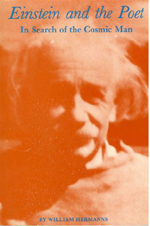 Available at Amazon --- 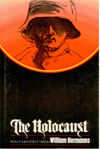 Inquire on out of print books - email now Translate page
View
Ctrl + to expand view Ctrl - to reduce view --- Like our facebook page WilliamHermanns to get website update notices and some uploaded poetry that talks to your soul. --- You can help our archive project - please or via other ways through our contact page. We'll continue to upload more gems from the archives. To My NeighborSeelentränen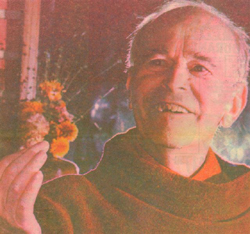 NavigationContact / Kontakt |
||||
|
|
The Holocaust - from a Survivor of Verdun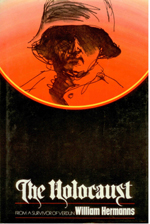
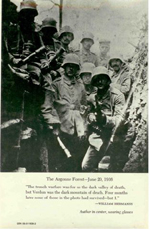 Original publication by Harper & Row, 1972 Excerpt -featuring the author's
Letter to Kaiser Wilhelm II:
From the Epilogue: As our ragged troop marched into the [French POW] camp, I noticed German prisoners, incurably ill or wounded, waiting, we were told, for passage to Switzerland, where they would be exchanged for French prisoners of war. An idea occurred to me. When I had finished my letter to the Kaiser, one such prisoner might mail it for me in Switzerland, since a letter had to be posted in a neutral country if it was to go from France to Germany. I was delirious with enthusiasm. I had indeed been saved, and now would begin living up to the vow I had made on the battlefield of Verdun. The letter to the Kaiser was the first task for my soul.
Souilly, France November 10,1916
Your Majesty: Eighteen days ago, on the 24th of October, I made a vow to God on the battlefield of Verdun, while digging myself out from bomb-scattered earth, that if He should save me, I would devote the rest of my life to Him. Three times that day I was saved: in the afternoon, from an engulfing gas attack which suffocated many comrades; in the evening, from a volley of bullets on my flight to Douaumont which felled my companion but not me; and in the night, when the French, although under orders to take no prisoners, captured me and led me unscathed to the rear. Now in their prison camp at Souilly, I learned from a report circulated by the French that on the 17th of October, Your Majesty visited your son, the Crown Prince and Commander-in-Chief of the Fifth Army, to try to discover an honorable way out of the discouraging predicament of Verdun. Two alternatives were presented to you which caused dissension between you and your son. The Crown Prince wanted to retreat to the lines we were holding before the offensive began, but you wanted us to advance a hundred yards up the plain so that the French could no longer look down into our shell holes and bombard us at will. The Crown Prince had his reasons. He feared he would be recorded in history as the "smiling assassin of Verdun," the name the French had given him. He knew that an advance such as you desired could only result in new hecatombs of dead, and shatter his last measure of prestige with the German soldiers. Your Majesty also had reasons. In accordance with the counsel of the Chief of Staff, you considered a retreat an admission to the French that Verdun could not be captured, and to the German people that your promises had no substance. This, you knew, might prove disastrous to your throne. According to the French report, two weighty promises were made last February when you stayed at your son's headquarters to honor the launching of the offensive with your presence. You announced to us: "This will be your last offensive." And the Crown Prince announced: "Children, on the parade grounds of Verdun, His Majesty, your Emperor and King, will dictate the peace treaty to the French." It is said you made other promises: to the army, that it would repeat the glory of Frederick the Great and that Verdun would outshine Waterloo, Sedan, and Tannenberg; to the industrialists, that Germany would not return to France and Belgium the industrial and mining regions it occupied; and to the German masses, "I will lead you into a glorious epoch!" Thus, the French said, you became a victim of your own promises. You could not retreat from Verdun without jeopardizing your dynasty. You fought with a delaying action in the hope that there would be a deus ex machina in the form of dissension among the Allies, or a peace proposal from the British, or a victory at the Russian front—a hope that some miracle would happen to confirm the historical good fortune of the House of Hohenzollern. The French report concludes with a question: "How many lives is the Hohenzollern Dynasty worth to the Kaiser, who, to save face, will not retreat from Verdun?" It is this question which spurs me to remember my vow at Verdun, which plagues me more than the lice, the dysentery, and the hunger I feel while lying on the straw in the sick tent, with comrades dying to the right and left of me. It is this question which drives me to write this letter, hoping to redeem for myself that which I pawned to God on the battlefield. Permit me to rise now in spirit and pass through the barbed wire of the camp, through the French lines, to draw you out of the isolated, palatial setting of the Court, and to lead you into military reality. Allow me to escort you to the shell holes between Fleury and Fort Souville where I, your once eager volunteer, lay with the 67th Regiment, so you can see the flesh of your men mingled with the soil. This place we called "the Death Mill of Verdun." You would also see how untenable our position was. The French, securely entrenched in the plain rising above us, could observe our slightest movement. At the first ray of dawn, our machine gunner peeked over the rim of the shell hole in which we were barely settled, and was instantly shot through the center of the forehead. While the French machine guns were sighted upon each shell hole, the French 75s were laying an iron net over our heads. The heavy shells, like big black birds, seared the air. As if this were not enough, our own artillery, at times falling short of the mark, exploded in our midst. I would ask you to call a roll of the dead from the nine-month offensive at Verdun. It would raise up French and Germans on a battlefield so small you could encompass it with the naked eye from the crest of Douaumont—so small the dead would have to stand on one another to find room. In those nine months at Verdun, more men fell than marched in Napoleon's Grande Armée to Russia. In the roll call, you would meet those men from our company. One would say, "My name is Berend; I was born in Berlin, I am forty-two years old, a butcher, and the father of five children." A second would say, "My name is Holsten; I was born in Danzig, I am twenty-eight, and I am a bookkeeper." A third would answer, "I am Schroeder; from Cologne, a volunteer and twenty years old. I studied medicine. I lost two brothers at the battle of Lange-marck." Each would end his story with the words "I died for Kaiser und Reich." . . . I would lead you along the same road, across the Meuse, to Verdun, which we few survivors traversed eighteen days ago. You would see, as we did then, a cathedral on the hill towering above the smoke and fire from the houses as if the city were elevating it, with its two spires pointing to the sky like two fingers in solemn oath: "We shall stand." I would show you the square at the foot of the towers where General Herr, commander of the French fortress of Verdun, inspected us, the ragged remnants of your Fifth Army. Is this not the same "parade ground" where Your Majesty said you would inspect a beaten French army and dictate the terms of surrender? Your eyes would fall on the words of Joffre, Petain, and Nivelle painted on the walls of the ruins surrounding us, reminding the French soldiers that their homeland was invaded and exhorting them to die on the spot rather than to yield. I read in the proclamations of your generals, Your Majesty, that we were fighting for "Kaiser und Reich" and that the "honor of Germany" was at stake. I would then take you along the road I trudged to the prison camp. Passing the cemetery wall, you would see painted on the stones, in red blood, huge letters, "five kilometers to the slaughterhouse." And beneath it an arrow pointing to Verdun. What war-weary, cynical Frenchman could have painted this sign? As we prisoners plodded along this road, fittingly named La Voie Sacree, because it was the only lifeline between Verdun and Paris, we passed regiment after regiment of Frenchmen, who cursed us, "Sale boche! Kaiser kaputt!" I would lead you on to Souilly and show you the place where eighteen days ago we dragged ourselves through the streets and an old washerwoman forced herself between the ranks of our guards, spat at us, and screeched, "You have killed my son!" A comrade who limped beside me in our sad procession said, "I never thought I would be ashamed to be a German. I don't think I can survive this day. I will commit suicide." At that moment I felt pity for Your Majesty. What terrible guilt you must feel when, through the letters you receive from the mothers of the dead, you learn of the despair and misery the war has wrought. I would conduct you to the steps of the city hall of the village where, at the beginning of your offensive, General Petain stood watching the French soldiers march toward Verdun. Without hiding his tears, he asked his staff, "How many will return?" Does Your Majesty now see what a terrible guilt I would feel if I did not speak out? I can no longer wait to fulfill my vow, for in this sick tent I do not know if I will live to see tomorrow. I can only serve God by serving mankind. Hence this outcry to you. I implore Your Majesty to consider the losses that this war is costing the Kaiser and Reich. Allow me to testify that General Ludendorff was wrong when he announced, "The Germans at Verdun are fighting a battle of attrition which will eat into the flesh of the French infantry like a gnawing ulcer." What I have seen as a common soldier in the front line was indeed a battle of attrition, but for both sides. If the enemy is bleeding white, then we are, too. What has become of me, Your Majesty's volunteer who, inspired by your speeches in 1914, could not join the army soon enough? How I dreamed of riding at your side through the Arc de Triomphe in Paris! Indeed, I marched through France, but not in triumph. I goosestepped on the cobbled streets of Verdun, but not before Your Majesty's generals—before the French. A young French lieutenant cried at us in Alsatian German: "Are you hungry? Sing 'Deutschland iiber Alles.' Are you thirsty? Sing 'Die Wacht am Rhein'; the Kaiser will come and save you." Reduced to a number in a green prison uniform, I was despised and smitten behind barbed wire before I could understand the protest made by Albert Einstein, the foremost mind in Berlin, against the 1914 Belgian invasion. His words "Force attracts only men of low morality" were passed over by Your Majesty's courtiers, who sneered, "Einstein is a moral leper." The French say in their report that in not retreating from Verdun you only want to save face. I believe I express the opinion of many soldiers when I-say that in this war it is not the Dynasty of Hohenzollern, it is not the honor of the Reich, which is at stake, but humanity. If our military statisticians gloat that in this or that battle the enemy lost twice as many men as we, they are blind to the fact that the same hate and the same agony of dying is released on both sides. These spiritual forces hovering over the battlefield will leave more black chapters in history and engender new wars. With each day that the war drags on, how many of the young Frenchmen and Germans now marching will be added to the roll call of the dead? How many hopes and dreams will die on the battlefield with them? How many contributors to humanity will be lost? If I were once again to hear the call of my country, I would respond; but this time I would, realize that though the responsibility for my actions belongs to my superiors, the responsibility for my conscience is mine. Your Majesty's volunteer, Wilhelm Hermanns Machine Gun Company 67th Regiment Dr. Linus Pauling, Twice Nobel Laureate first in Chemistry and and then in Peace, wrote in 1972: "I have read with great interest the book The Holocaust by Professor William Hermanns. This powerful book shows how evil war was in the prenuclear age. It should be read by everyone. It's message is that we must eliminate all war from the world, not just nuclear war." ~~~~~~~~ Archbishop Fulton J. Sheen told the author that he had read the book through the night and could not lay it down. He wrote in 1972: "Young men may know about war in two ways: by carrying banners of protest under the full glare of television cameras, or by living through the muck and mud and carnage of war as Professor Hermanns had done, in his recreation of the Battle of Verdun." ~~~~~~~~ Dr. Peter Phillips, Professor of Sociology at Sonoma State University and radio co-host on the Project Censored Pacifica radio show on KPFA, wrote in 2012: "Hermanns’ The Holocaust brings a message of resistance to war that is broadly needed in the world today. We all have the internal intuition that Hermanns recognized on the battlefield. That inner core of knowing war is wrong and Thou Shall not Kill is our common foundation for new movements of peace. Hermanns gives us insight into human despair, and the forces of evil in the world." Link to Full Text pdf ~~~~~~~~
|
Please support our sponsors Click on image to be directed to their website ~~~~~~~~ Your Sponsorship Here ~~~~~~~~ ~~~~~~~~ ~~~~~~~~ Norton & Holtz Business Solutions
~~~~~~~~
~~~~~~~~ ~~~~~~~~ Published Books - Click cover image for it's webpage:  Available at Amazon ---  Inquire on out of print books ~~~~~~~~
|
|
|
|
|
|
|
||
|
Prose and Plays |
|
Poetry |
|
Events |
|
Website Info |
Website © Copyright 2011, 2012, 2013 by Kenneth E. Norton Articles by William Hermanns (c) by William Hermanns Trust |
||||||